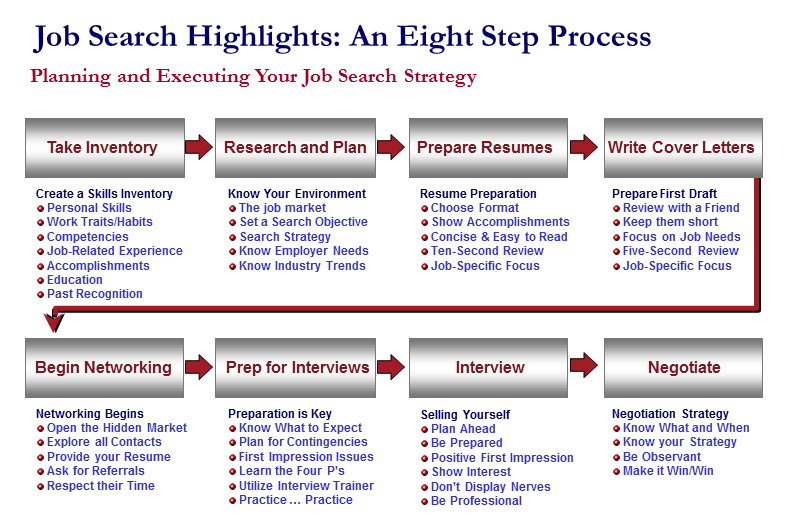
Jump Start: Personal Inventory and Planning
Developing a Skills Inventory and Job Search Strategy
What: Develop an inventory of your skills, experience, training, etc. Set an objective and plan
your job search strategy.
Why: You will be competing with lots of other candidates. You must position yourself as the
employer's best choice.
How: Begin by creating a personal skills inventory with notable accomplishments, etc. Then formulate
a job search plan.
In this Job Search Jump Start, we'll highlight key concepts and combine some steps for a quick overview (or refresher)
of the job search process. Starting with the inventory and planning steps, the following graphic provides a high-level
look at the end-to-end process.

Eight-Step Job Search
Creating a Skills Inventory
An important part of the job search process is the ability to effectively market yourself to prospective employers.
To do so, you must first understand what aspects of your background would appeal to an employer. A good place to start
is to create an inventory of your skills, competencies, work experience, education, accomplishments, etc. Include anything
that you believe will be marketable to an employer.
Think about the things you have done in the past, the accomplishments you're most proud of, any special projects
you may have worked on, compliments from your supervisors, unique skills or talents from your personal life, or any
other relevant matters that might be important to a prospective employer. These things will become the foundation of
a personal skills inventory.
The Skills Inventory form
(which you can download) will help you take a critical look at your background and experience. It will lay out a foundation
that will help you set realistic job search goals and develop a plan to achieve those goals. This process will also
help you prepare for job interviews.
Using your skills inventory, put together a 30-second introduction about yourself. Include key elements of your background,
skills, accomplishments, etc. Whether talking to recruiters, interviewing or networking, this 30-second introduction
will serve you well.
Things to Consider
- Your strongest and most marketable attributes
- Unique skills that other job applicants might not possess
- Demonstrated ability to solve problems or accomplish tasks
- How to characterize your skills and accomplishments in the most positive light
- How you have used your skills and experience to advance in your career
Setting Your Job Search Objective
If you don’t have a job objective, it is hard to plan an effective strategy on how to get there. Setting an objective
gives direction to your search efforts, helps you focus your resume, and enables you to effectively talk about your
job goals with recruiters and hiring managers. If asked, can you describe your objective in a sentence or two?
Your job objective should relate to who you are and what is important to you, such as your skills, interests and
values. It should clarify the role you prefer and the level of responsibility you are seeking. If you decide that a
full-time job is not the right path for you, you may choose to pursue an entrepreneurial track, such as becoming an
independent consultant or starting a business.
Things to Consider
- Achievements that you enjoyed accomplishing
- Your personal vision for the future, e.g., 5 or 10 years from now
- Tasks you do well, or not so well
- Your education, skills and competencies
- Your vision of the ideal job
- Work and personal life balance
Setting a Job Search Strategy
A strategy can be thought of as a plan or road map to achieve your job search objective. If you understand your job
market and set a realistic job search objective, you can then start to think about how you go about achieving your objective.
Your job search strategy should include standard tools such as creating one or more resumes, targeting various employers
in your field, and various job search techniques, e.g., direct mail, Internet, personal networking, social networking
sites, etc.
Part of setting a job search strategy is to think about how you want to position yourself in the eyes of prospective
employers. Most people applying for a particular job will have similar backgrounds and skills to yours. The question
to ask yourself is "How do I stand out from the rest of the crowd?"
Think about how you would position or differentiate yourself so that you have a competitive edge over your competition.
It is much like developing a marketing campaign that is designed to sell you and your abilities to an employer.
Things to Consider
- Creating one or more resumes, cover letters, and success stories
- Sources of job openings, recruiters and contacts
- Networking ideas, and who to network with
- How you can differentiate and sell yourself
- Organizing and tracking your job search efforts
Key Points
- Create a skill inventory so you have a clear picture of what you have to offer an employer.
- Use the skill inventory to create a 30-second introduction for yourself.
- You need job search skills and an effective plan in order to be successful in your job search.
- Set a job search objective and then develop a strategy to achieve that objective.